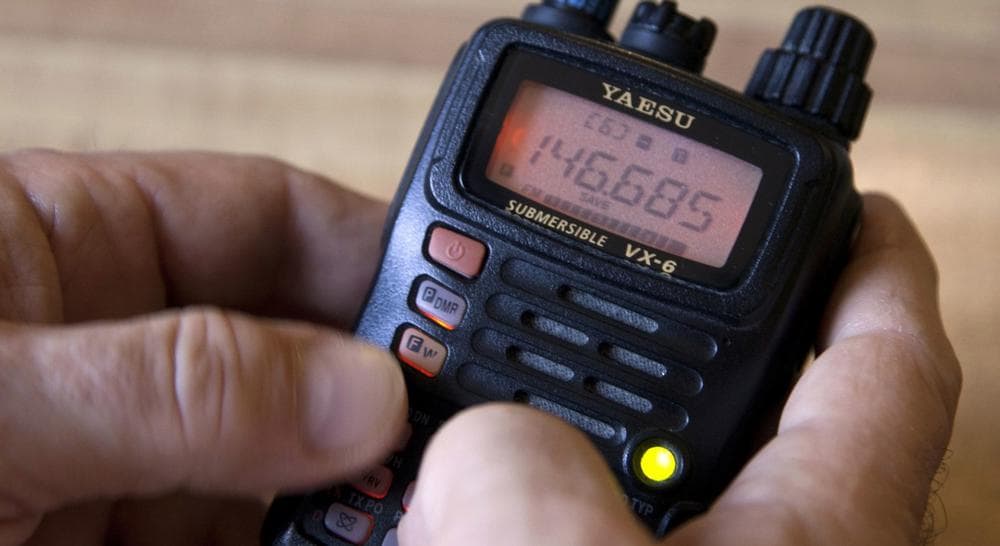Advertisement
In Journalism 101, Police Scanners Are Not News. In A Manhunt, All Bets Are Off
In the stir-crazy madness of last week's lockdown and manhunt for the marathon bombers, thousands of people decided they had found the perfect recipe for real, live, up-to-the-minute news: an unfiltered police scanner and Twitter.
It's not the first time it's happened. But the Boston-area police search may mark a point when instantly reporting snatches of conversation and overheard tips from a police radio became a go-to source for legions of people.
Any reporter who was trained in an honest-to-goodness newsroom knows this much: The police scanner is a blunt instrument, not a source of solid facts.
And that’s unfortunate. Not because technology is the enemy, or because people shouldn't be informed. I fear this change because eventually, the police will tire of having to tamp down runaway reports based on nothing more than scanner whispers — and take the stream out of public use.
Any reporter who was trained in an honest-to-goodness newsroom knows this much: The police scanner is a blunt instrument, not a source of solid facts. It's a real-time conversation of tips, rumors, and leads being passed back and forth by untold numbers of nameless officials.
The stuff being said over those airwaves is definitely real. But it isn't necessarily true.
Civilians can be forgiven for not knowing this. But professional journalists? Yikes. If you care about your audience, you don't report what you hear come over the scanner, without confirming it first.
Sadly, in the insane rush to get the latest information about the Boston manhunt, many in the media tossed this rule overboard. As you might be able to guess, bad things happened.

The lightest offenses were confusing reports of possible additional suspects being questioned or pursued, which turned out to be dead ends. The worst was when obsessive scanner-tweeters started spreading two false suspect names, including that of a missing Brown University student.
As Alexis Madrigal at The Atlantic showed in great detail, that bit of scanner-bait was just too irresistible. Many people in the media repeated the bogus suspect names, including the social media editor for Newsweek, the media reporter for Politico, and Slate columnist Farhad Manjoo. (There's now even some question about whether the missing student's name was even read over the scanner, which makes things even weirder.)
As a reporter by trade, holed up in my house on Friday as a rapt media consumer, I was bewildered at the number of press people who apparently didn't know that scanner traffic is too dangerous to repeat as a source.
Here's a prime example: On the Media, the nationally syndicated NPR media criticism show, performed a deconstruction of this very phenomenon in its most recent episode. Host Brooke Gladstone talked to one of the show’s producers — he was among those spreading false suspect names on Twitter — and tried to retrace how the thrill of being in the mix can blow past all good sense.
But Gladstone herself seemed to be unaware that sending out scanner reports was a foundational journalistic no-no. Here's what she tweeted during the chaos:
I don't know how the scanner plays into the week's coverage, except as an alternative to other media. But is it truer? It's so incremental— Brooke Gladstone (@OTMBrooke) April 19, 2013This is a bona fide media critic, pondering the verity of a fricking police scanner. Something you're supposed to learn your first month on the job.
So why aren't more of us aware of the dangers of relying on scanners? Sadly, it's probably yet another holdover from the old, dependable, industrial days of the news business, when the priesthood in charge of all information processing could pass along its wisdom hand-to-hand, never worrying that someone would start reporting the news without first getting the lesson.
We should correct that, and quickly. Newsrooms and the people who run them have built up a huge amount of knowledge about the finer points of sorting information in real time — how to chase down leads, verify or knock down rumors, and make sure you're not running with a half-baked theory.
Why aren't more of us aware of the dangers of relying on scanners? Sadly, it's probably yet another holdover from the old, dependable, industrial days of the news business...
Media and publishing are expanding almost too quickly to comprehend now, and that won't stop. If news operations start sharing their lessons and knowledge, it can help ensure that good values are baked into the equation.
(Hey, maybe it’d even help the professionals follow their own advice — the early, incorrect reports of a bombing suspect arrest showed just how much can be lost when you ignore your own rules on anonymous sourcing, as The Associated Press explained this week.)
Or the press could choose to keep this stuff locked up in the heads of its current practitioners. Damn the torpedoes — who the hell listens to Twitter anyway? But if it spirals out of control, and police scanners start to evaporate, we’ll carry some of the blame.
This program aired on April 24, 2013. The audio for this program is not available.